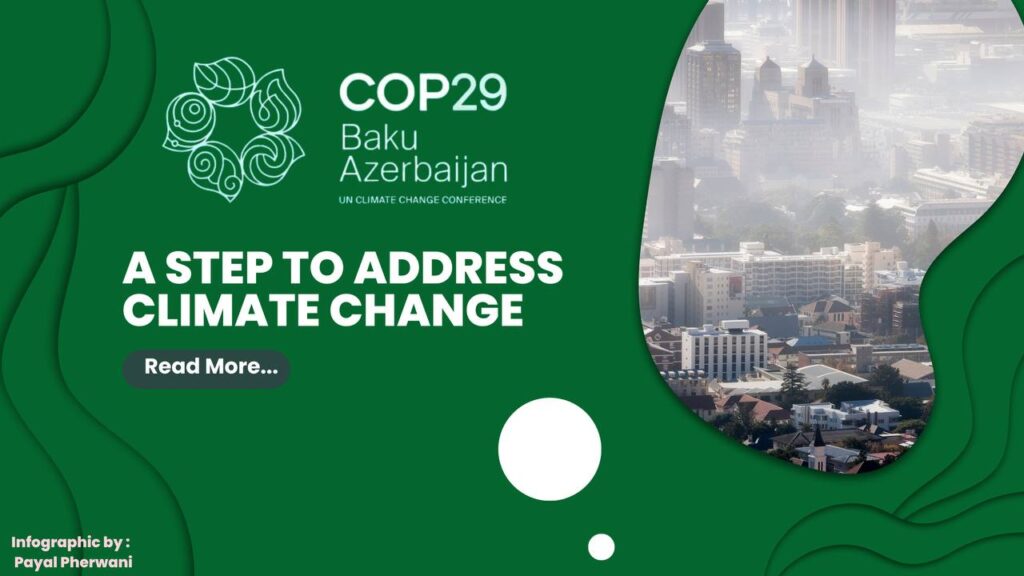COP29: After many years of being overlooked, climate change has become a prominent issue in the media and society. Year after year, the effects of climate change have been felt globally, consequently forcing the world to address the elephant in the room. The poor air quality index (AQI) and the change in weather patterns have severely impacted the world, particularly in India, with New Delhi now being labelled as the most polluted city in the world.
Moreover, due to climate change, floods, droughts, and cyclones have become common, affecting countless lives across the world. Media reports also suggest that millions of people are expected to become homeless in the next few decades.
Contribution from the Centre for Science and Environment
Upamanyu Das contributed to this story on behalf of the CSE team. For those unversed, CSE is a public interest research organisation based in New Delhi focusing primarily on environmental issues. Upamanyu Das notes that many developing and underdeveloped countries request between $1 trillion and $3 trillion to address their climate needs, but developed countries have not yet responded regarding climate funding. He adds, “Countries in Africa and Asia struggle to meet socio-economic and development goals while also managing debt.”
Worldwide climate issues
The climate challenges are not limited to one country; many developing and underdeveloped nations face similar issues. There is a growing awareness that decisive action must be taken to rectify these problems and restore balance to our environment.
To mitigate these risks, the United Nations (UN) started organising different meetings to seek international collaboration. These are known as COPs. COP refers to the Conference of the Parties, where many countries that signed the UN Framework Convention on Climate Change gather to discuss climate-related issues.
About the 29th Conference of the Parties (COP29)
The 29th Conference of the Parties (COP29) under the UN Framework Convention on Climate Change occurred in Baku, Azerbaijan. The COP29 meeting, which ended on 22 November 2024, decided that to balance development and climate change, it is crucial to focus on renewable energy, which requires adequate funding. Thus, COP29 aimed to address climate financing as a key topic of discussion.
However, the issue of climate funding has become quite contentious in recent decades, as many developing and underdeveloped countries rely on these funds to contribute effectively to climate initiatives. Developed nations have often failed to meet even their self-imposed targets to assist developing countries.
The United States has played a significant role in these discussions. However, in 2017, US President Donald Trump withdrew from the Paris Climate Agreement. Upamanyu Das argues that Trump’s reelection in 2024 raises critical questions about the future of climate funding and poses a threat to multilateral climate negotiations, as evidenced by his actions in 2017.
COP29’s Location Sparks Controversy
Azerbaijan, a country rich in oil and natural gas, plays a vital role in the climate crisis. The choice of Azerbaijan as the location for COP29, which is focused on addressing environmental issues, generated mixed reactions worldwide.
Upamanyu Das argues that the choice of location adds a political dimension to the conference. Previous COP meetings were held in cities like Dubai and the UK, which are also rich in oil and fossil fuels. Nonetheless, the focus should be on conversations and finding solutions.
Climate Journalism and COP
According to Upamanyu Das, climate journalism extends beyond the objectives of COP. It can operate as both a parallel and consecutive process to the conference’s discussions and outcomes.
Current Climate Change Concerns in India
Delhi Becomes the Most Polluted City in the World
The current levels of air pollution in northern India are extremely concerning, particularly due to their devastating impact on public health. The reasons behind this pollution are closely linked with meteorological conditions, policy decisions, urban planning, and their implementation. High smoke, dust, and emissions from construction, industry, and transportation are major contributing factors. Additionally, there is a rise in stubble burning by farmers in Punjab and Haryana at this time of year.
The CSE (Centre for Science and Environment) team notes that Delhi citizens and their policymakers must recognise the severity of the risks posed by pollution and effectively move away from harmful practices in both urban and rural areas. This includes transitioning to green transportation focused on public transit, promoting sustainable industrial practices, finding practical solutions to the issue of stubble burning, and enforcing strict environmental regulations.
Is an Awareness Drive Enough?
According to Upamanyu Das, while awareness drives are important, they are only one aspect of the solution. State-level policies and international negotiations play a far more crucial role in controlling the global warming issues that we are currently experiencing.
Awareness drives primarily engage the country’s citizens, but a substantial portion of emissions originate from industries and corporations.
Climate change has many facets that must be addressed, including the damage caused by the climate crisis. For example, cities are experiencing extreme cyclones and heavy rainfall, yet we are not adequately responding to these events. These changes have profoundly affected many lives and have led to increased migration. Moving forward, the state must adopt steps to limit damages and mitigate climate risks as much as possible.
Copyeditor: Abhijeet Sen

